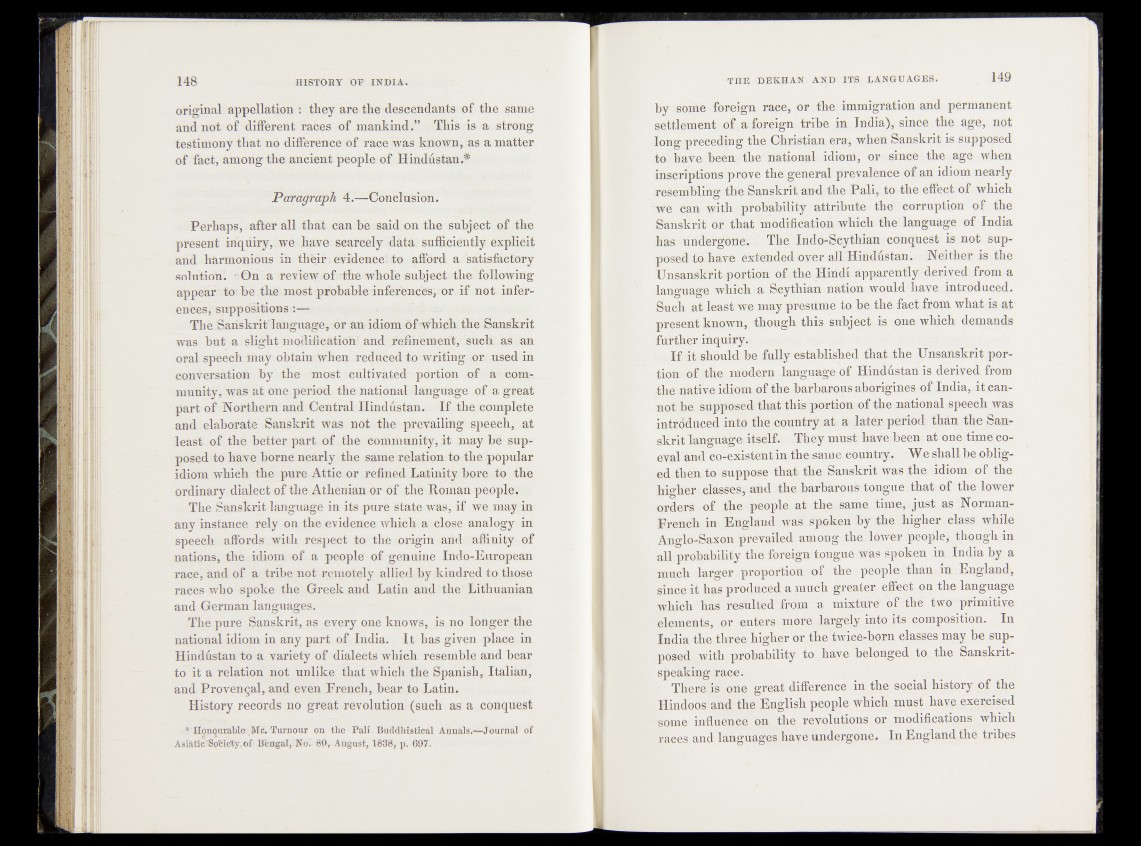
original appellation : they are the descendants of the same
and not of different races of mankind.” This is a strong
testimony that no difference of race was known, as a matter
of fact, among the ancient people of Hindustan.*
Paragraph 4.—Conclusion.
Perhaps, after all that can be said on the subject of the
present inquiry, we have scarcely data, sufficiently explicit
and harmonious in thmr. evidence: to afford a . satisfactory
solution. .On a review of -the whole subject the following
appear torbe the most probable inferences, or if not inferences,
suppositions’:—
The Sanskrit language, or an- idiom of'which tMeSanskrit
was but a slight modification7 and refinement,'such as an
oral speech may obtain when .reduced to writinguorj used in
conversation by the most cultivated portion of a-community,
was at one period the national language of a great
part of Northern and Central Hindustan. If the complete
and elaborate Sanskrit was not the prevailing speech, at
least of the better part of the community, it may . be supr
posed to have borne nearly the same relation to the popular
idiom which the pure Attic or refined Latinity bore to the
ordinary dialect of the Athenian or of the Roman people.
The Sanskrit language in its pure state was,Jf we may in
any instance rely on the evidence which a close analogy in
speech affords with respect to the origin and affinity of
nations, the idiom of a people of genuine Indo-European
race, and of a tribe not remotely allied by kindred to those
races who spoke the Greek and Latin and the Lithuanian
and German languages.
The pure Sanskrit, as every one knows, is no longer the
national idiom in any part of India. It has given place in
Hindustan to a variety of dialects which resemble and bear
to it a relation not unlike that which the Spanish, Italian,
and Provençal, and even French, bear to Latin.
History records no great revolution (such as a conquest
. Honourable-.'.M e . Turnour on the Pali Buddhistical Annals.—Journal of
AsiaUc^Speietyof' Bengal/Noi. 80, August, 1838, p. 697.
by some foreign race, or the immigration and permanent
settlement of a foreign tribe in India), since the age, not
long preceding the Christian era, when Sanskrit is supposed
to have, been the national idiom, or since the age when
inscriptions prove the general prevalence of an idiom nearly
resembling'ihe Sanskrit and the Pali, to the effect of which
we can with probability attribute the corruption of the
Sanskrit or that modification which the language of India
Las undergone. The Indo-Scythian conquest is not supposed
to have extended oyer alLHindustan. Neither is the
Unsanskrit portion of the* Hindi apparently derited from a
language which a Scythian nation would have introduced.
Such at least we may presume,to be the fact from what is at
present known, though this subject; is one which demands
further inquiry.
If it should be fully established that-the Unsanskrit portion
of the modern languagebf Hindustan is derived from
hhemative idiom of the barbarous aborigines of ;India, it cannot
be supposed that this portion of the national speech was
introduced into the country nt a later period than the Sanskrit
language itself. They must havfebeem.at one time coeval
and co-existent in the same ebuntry. We shall be obliged
then to suppose that the Sanskrit was the; idiom of the
higher-classes, and the barbarous tongue.that of’the lower
orders of the people at the same time, just as Norman-
French in England Avas spoken by the higher class while
Anglo-Saxon prevailed among the lower people, , though in
all probability theforeign tongue,wias spoken in .India by a
much larger proportion:: of the people than in England,
since it has produced a much greater effect on the language
which has resulted fiom a mixture of the two primitive
elements, or enters more largely, intoits/epmposition. In
India the three higher or the twice/horn classes may be supposed
with probability to have belonged to the Sanskrit-
speaking race.
Therels one great difference in the social history of the
Hindoos and the English people which must have oxeceised
-gome influence on the revolutions or modifications which
races and languages have undergone. In England the tribes